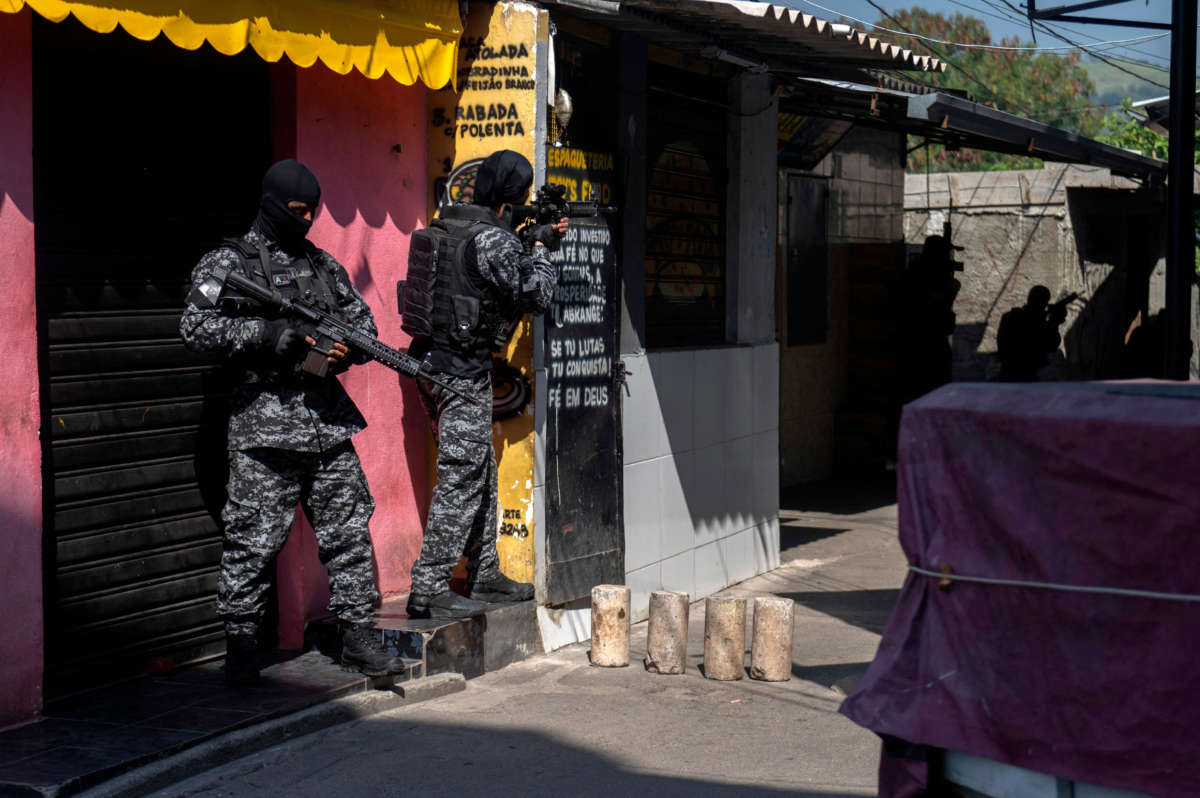Support justice-driven, accurate and transparent news — make a quick donation to Truthout today!
More than 100 heavily armed Brazilian police officers stormed a sprawling Rio de Janeiro favela Thursday and killed at least two dozen people, a raid that human rights activists, researchers, and journalists described as the deadliest such police atrocity in the city’s history.
The hourslong operation, purportedly aimed at drug traffickers in the poverty-stricken Jacarezinho favela, ultimately left 25 people dead, including one police officer. Horrific video footage and images posted to social media in the wake of the raid — which was carried out despite a court order against such incursions during the Covid-19 pandemic — show favela residents surveying rooms, hallways, and alleys streaked with blood.
“It’s extermination — there’s no other way to describe it,” Pedro Paulo Santos Silva, a researcher at Rio’s Center for Studies on Public Security and Citizenship, told The Guardian. “This was a massacre.”
(Warning: the following footage is disturbing)
Uma casa invadida e esse eh o resultado pic.twitter.com/gf8lVZMqCh
— Joel Luiz Costa (@joelluiz_adv) May 6, 2021
“Really grim moment in Brazil,” Robert Muggah, co-founder of the Igarapé Institute, a Rio-based think tank, said in an interview with the Washington Post. “These shootings are obviously routine in Rio de Janeiro, but this is unprecedented, in that it’s the operation that has generated the largest number of deaths, ever.”
Brazilian lawmaker David Miranda, who grew up in Jacarezinho, called the deadly police raid “a tragedy, a slaughter authorized by Cláudio Castro,” Rio’s governor.
“Jacarezinho is my origin, it is the favela that created me,” said Miranda. “No person born outside the favela can know what that is. Brazilian institutions insist on disrespecting and marginalizing the favela.”
Journalist Glenn Greenwald, Miranda’s husband, wrote on Twitter that he has “seen probably two dozen videos that are way too horrifying to publish: police enter homes with full force and violence, and then execute people as they lay on the ground, shooting them 10-15 times each in the head.”
“It’s an atrocity what happened today,” Greenwald added.
Brazil suffers one of the highest rates of police killings in the world, and the nation is currently led by a far-right president who campaigned on the promise to “give the police carte blanche to kill.” According to Human Rights Watch, Rio law enforcement officers killed 453 people during the first three months of 2021.
“They say there is no death sentence in Brazil. Except if you live in a favela,” said Marilia Corrêa, a Latin America historian and postdoctoral fellow at the University of Michigan’s Weiser Center for Emerging Democracies. “In this case, the police can just march in, kill dozens of people, and call it a day. This is appalling, revolting, outrageous. They have no right.”
Jurema Werneck, executive director of Amnesty International Brazil, said in a statement Thursday that “the number of people killed in this police operation is reprehensible, as is the fact that, once again, this massacre took place in a favela.”
“It’s completely unacceptable that security forces keep committing grave human rights violations such as those that occurred in Jacarezinho today against residents of the favelas, who are mostly Black and live in poverty,” said Werneck. “Even if the victims were suspected of criminal association, which has not been proven, summary executions of this kind are entirely unjustifiable.”
Trump is silencing political dissent. We appeal for your support.
Progressive nonprofits are the latest target caught in Trump’s crosshairs. With the aim of eliminating political opposition, Trump and his sycophants are working to curb government funding, constrain private foundations, and even cut tax-exempt status from organizations he dislikes.
We’re concerned, because Truthout is not immune to such bad-faith attacks.
We can only resist Trump’s attacks by cultivating a strong base of support. The right-wing mediasphere is funded comfortably by billionaire owners and venture capitalist philanthropists. At Truthout, we have you.
Our fundraising campaign is over, but we fell a bit short and still need your help. Please take a meaningful action in the fight against authoritarianism: make a one-time or monthly donation to Truthout. If you have the means, please dig deep.
